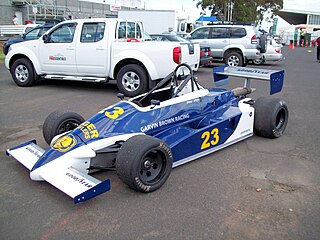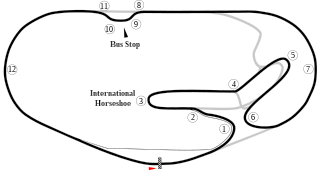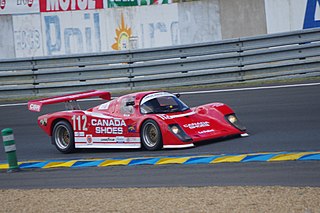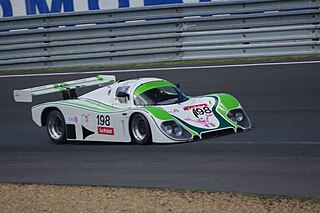Related Research Articles

The Nissan Skyline GT-R is a Japanese sports car based on the Nissan Skyline range. The first cars named "Skyline GT-R" were produced between 1969 and 1972 under the model code KPGC10, and were successful in Japanese touring car racing events. This model was followed by a brief production run of second-generation cars, under model code KPGC110, in 1973.

The Ferrari 250 GTO is a grand tourer produced by Ferrari from 1962 to 1964 for homologation into the FIA's Group 3 Grand Touring Car category. It was powered by Ferrari's Tipo 168/62 Colombo V12 engine.

The World Sportscar Championship was the world series run for sports car racing by the FIA from 1953 to 1992.

Spice Engineering was a British racing team founded by driver Gordon Spice with Raymond Bellm in the early 1980s, later becoming a successful sports car constructor in 1986. They competed in the World Sportscar Championship in Europe as well as the IMSA GT Championship in North America, at times partnering with major manufacturers such as General Motors and Honda as well as race engine manufacturer Comptech.

IMSA GT was a sports car racing series organized by International Motor Sports Association. Races took place primarily in the United States and occasionally in Canada.

The Australian GT Championship is a CAMS-sanctioned national title for drivers of GT cars, held annually from 1960 to 1963, from 1982 to 1985 and from 2005. Each championship up to and including the 1963 title was contested over a single race and those after that year over a series of races. The categories which have contested the championship have not always been well defined and often have become a home for cars orphaned by category collapse or a sudden change in regulation.

Tiga Race Cars Ltd. was a British auto racing constructor and team. The company was founded in 1974 by two former Formula 1 drivers, Australian Tim Schenken and New Zealander Howden Ganley. The company's name was formed by the first two letters of Tim and Ganley. Tiga constructed racing cars for various forms of open wheel racing and sports car racing, ranging from Formula Ford to the World Sportscar Championship.
Alfredo Costanzo is a retired Italian born Australian racing driver. From 1980 to 1983 Costanzo won four Australian Drivers' Championships in a row, equalling the record set by Bib Stillwell from 1962 to 1965.
John Schneider is a former American sports car racing driver.

The March 83G is a IMSA GTP/Group C sports prototype race car, designed, developed and built by British manufacturer and constructor March Engineering, for sports car racing, in 1983.

Robin Donovan is a British former racing driver. He is best known for competing in 14 editions of the Le Mans 24 hours race; his best result there being 6th overall, 3rd in class (LMP1) and 1st privateer home driving with 5 x Le Mans winner Derek Bell MBE and Daytona 24 hours winner Jurgen Lassig in 1994 with the Gulf Racing entered and sponsored Kremer Porsche K8.

The IMSA SportsCar Championship, currently known as the IMSA WeatherTech SportsCar Championship under sponsorship, is a sports car racing series based in the United States and Canada and organized by the International Motor Sports Association (IMSA). It is a result of a merger between two existing North American sports car racing series, the American Le Mans Series and Rolex Sports Car Series. At its inception, the name was United SportsCar Championship, which subsequently changed to IMSA SportsCar Championship in 2016. Rolex SA's Tudor brand was the championship's title sponsor in 2014 and 2015, and since 2016 WeatherTech has served as title sponsor.

The Ferrari 488 GTE is a grand tourer racing car built by Ferrari's in-house Competizioni GT unit, for competition in endurance racing. It is a replacement for the Ferrari 458 Italia GT racing car, using the Ferrari 488 GTB as a base. The car is built in accordance with the Automobile Club de l'Ouest/FIA LM GTE regulations introduced for the 2016 season, and it currently competes in the IMSA WeatherTech SportsCar Championship, FIA World Endurance Championship, and the European Le Mans Series. The car had its race debut at the 2016 24 Hours of Daytona, with the Scuderia Corsa and Risi Competizione teams.

The 26th Annual SunBank 24 at Daytona was a 24-hour endurance sports car race held on January 30–31, 1988 at the Daytona International Speedway road course. The race served as the opening round of the 1988 IMSA GT Championship.
The March 82G is a IMSA GTP/Group C sports prototype race car, designed, developed and built by British manufacturer and constructor March Engineering, for sports car racing, in 1982. It competed in motor racing between 1982 and 1986, but only scored 1 race win, 8 podium finishes, and 2 pole positions. It was powered by a naturally-aspirated 620 hp (460 kW) 5.7 L (350 cu in) Chevrolet V8 engine.

The Tiga GC287 is a sports prototype race car, designed, developed, and built by British manufacturer Tiga Race Cars, for sports car racing, conforming to the Group C2 rules and regulations, in 1987.

The Tiga GC286 is a sports prototype race car, designed, developed, and built by British manufacturer Tiga Race Cars, for sports car racing, conforming to the Group C2 rules and regulations, in 1986.
The Tiga GC285, also known as the Tiga GC85, is a sports prototype race car, designed, developed, and built by British manufacturer Tiga Race Cars, for sports car racing, conforming to the Group C2 rules and regulations, in 1985.

The Tiga GC288 is a sports prototype race car, designed, developed, and built by British manufacturer Tiga Race Cars, for sports car racing, conforming to the Group C2/IMSA GTP Lights rules and regulations, in 1988.

The Tiga GC289 is a sports prototype race car, designed, developed, and built by British manufacturer Tiga Race Cars, for sports car racing, conforming to the Group C2/IMSA GTP Lights rules and regulations, in 1989.
References
- ↑ "1986 Tiga GT286 Mazda Specifications". Ultimatecarpage.com.
- ↑ "1986 Tiga GT286/9 technical and mechanical specifications". conceptcarz.com.
- ↑ "Tiga GT286 - Photo Gallery - Racing Sports Cars".
- ↑ zone, Author the braking (March 20, 2020). "Tiga GT286".
{{cite web}}:|first=has generic name (help)